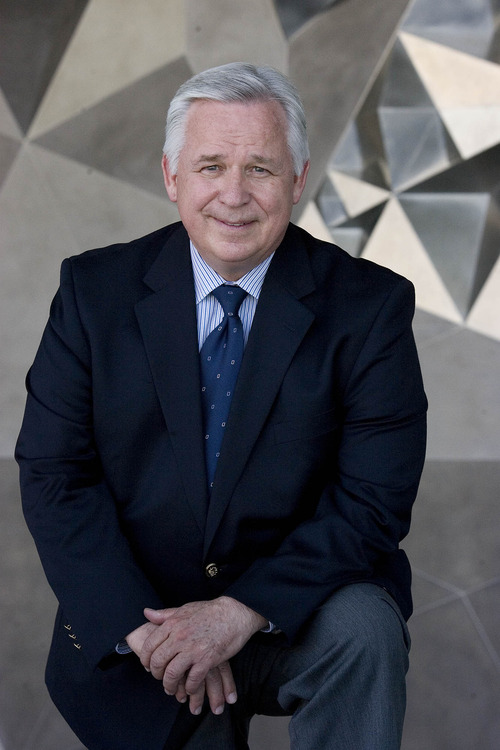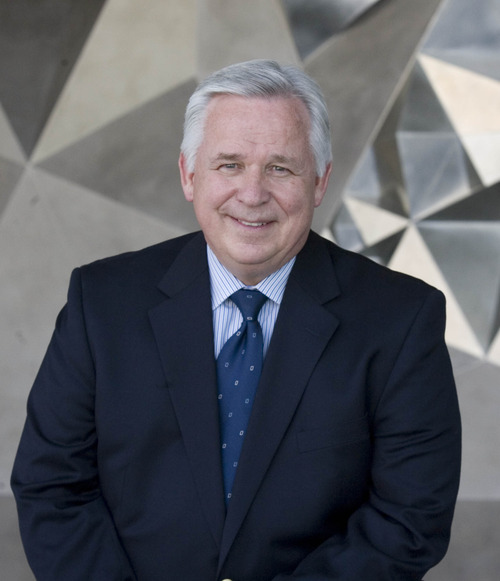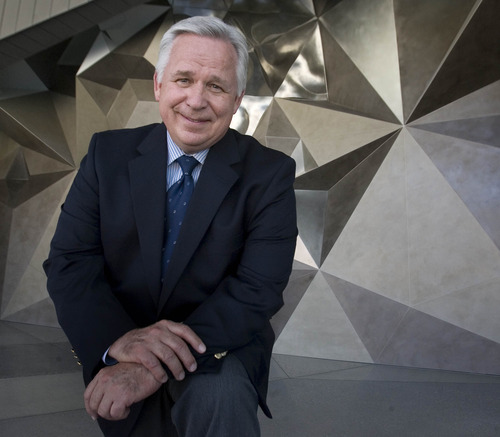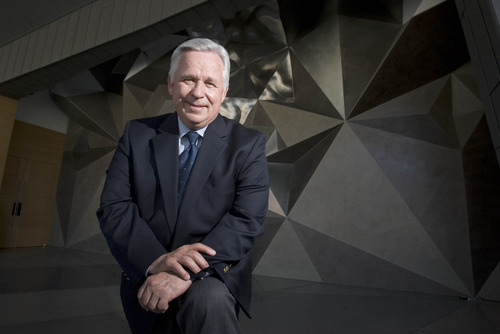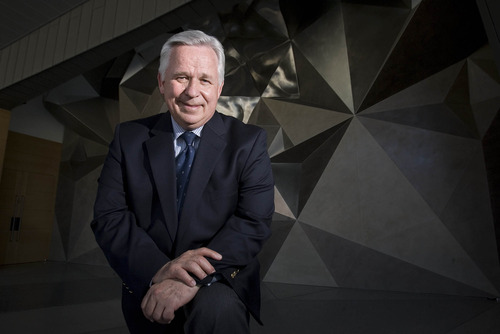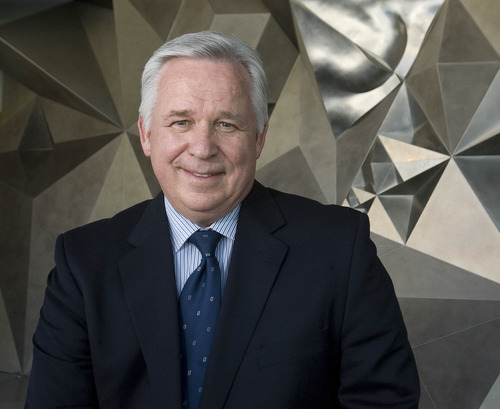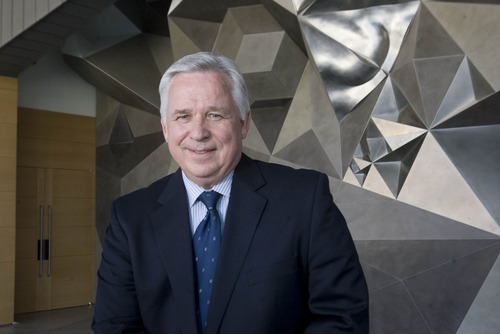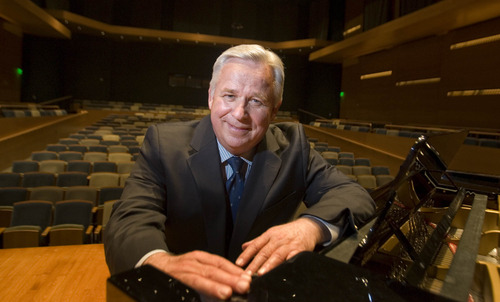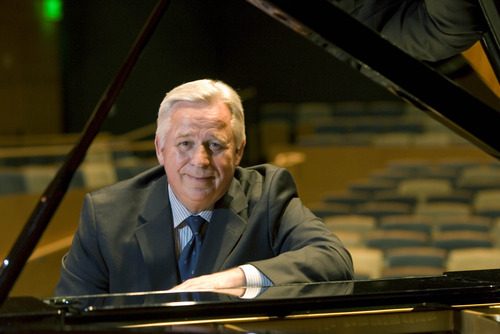This is an archived article that was published on sltrib.com in 2013, and information in the article may be outdated. It is provided only for personal research purposes and may not be reprinted.
Craig Jessop was determined to be a music professor from a young age. He achieved his goal — eventually.
"Life had the most amazing plan," said Jessop, recipient of the 2013 Madeleine Award for Distinguished Service to the Arts and Humanities.
The award honors Jessop for his service to the arts in Utah, including his nine years as music director of the Mormon Tabernacle Choir and his current leadership of Utah State University's Caine College of the Arts.
Walter Rudolph, former general manager of Classical 89 radio and a member of the selection committee, considers Jessop an unsung hero of the choral world. "Craig is not a guy who stands out there and waves a flag [for himself]," Rudolph said.
Tim Sharp, executive director of the Oklahoma City-based American Choral Directors Association, is happy to wave that flag for him.
"He's a legendary figure, one of the heroes of our association," said Sharp, who called the Dallas Symphony Chorus' performances of Benjamin Britten's War Requiem — led by Jessop — a highlight of the association's recent national conference.
"He's a consummate musician and very clear communicator of musical ideas," Sharp said. "But the thing that truly distinguishes him is his grasp of humanity. He's a really caring, approachable human being who has something to say about music. He brings out the best in people."
—
Rural roots • Jessop was born in Logan in December 1949, "during the famous-even-now blizzard" and grew up in the Cache County farming town of Millville. When Craig was 4, his father, Don, fell off the roof of a barn, breaking his neck. The former rodeo rider, just 26 at the time, was paralyzed from the waist down. His wife, Dortha, was 22.
"It affected us profoundly," Craig Jessop said. Dortha Jessop, who still lives in Millville, worked at the USU bookstore to support the family; Don taught Craig and his younger brother how to raise registered quarter horses — the family trade. "We were his legs," said Jessop, who despite his father's physical limitations remembers his childhood as idyllic. "Our home was filled with love, mutual support and kindness. … We had a million-dollar childhood and didn't know it — only the very wealthy seem to have horses these days."
But music, not horsemanship, was Jessop's passion. He served an LDS Church mission in northern England, earned music degrees from USU and Brigham Young University, married RaNae Remund — whom he'd met in choir at USU, and with whom he now has four grown children — then taught for 2 1/2 years at Salt Lake City's Granite High.
Meanwhile, he sang baritone in the Mormon Tabernacle Choir for four years and has remained a lifelong fan. Former missionary companion Kent Winder, vice president of Winder Farms, remembers Jessop listening to tapes of the choir every night. "It almost drove me nuts, but it probably did me some good," Winder said.
After winning regional honors in the Metropolitan Opera auditions and a spot in San Francisco Opera's Merola Training Program, Jessop earned a doctorate at Stanford University. By then he'd concluded that he didn't want to be a professional singer.
"My voice always got me into places," he said, "but I really wanted to be a conductor."
Then life took an unexpected turn.
"Out of the blue, I was invited to audition for the Singing Sergeants," said Jessop, who had enlisted in the U.S. Air Force but served only 90 days on active duty before the Vietnam War ended. "I'd never heard of them and thought it sounded kind of hokey." But he spent eight years singing in and conducting the elite Air Force-sponsored chorus, then another eight years leading the Band of the U.S. Air Forces in Europe and the Air Combat Command Heartland of America Band. Jessop retired from the Air Force as a lieutenant colonel in 1995, when he was appointed associate conductor of the Tabernacle Choir.
—
Transformative years • His service with the military bands helped bring him to the attention of Robert Shaw, one of the giants of American choral music. Jessop sang and recorded with the Robert Shaw Festival Singers, soaking in the great conductor's knowledge. "Those were transformative years for me," he said.
Shaw was set to conduct the Tabernacle Choir and Utah Symphony in his new English-language edition of Brahms' "A German Requiem" in February 1999. But a couple of weeks before the concerts and recording session, Jessop was in the hospital with his father when he received word that his mentor had died of a stroke.
Don Jessop died the next day.
With the choir's then-music director, Jerold Ottley, away on a rare vacation, it fell to Craig Jessop to lead the evening rehearsal of the Requiem — which the composer wrote in memory of his own mother. He later conducted the performances and recording.
"It's pretty tender, even now," Jessop said. "I will never, ever forget the choir singing those beautiful words: 'Blessed are they that mourn, for they shall find comfort.' I was surrounded by a sea of love."
Jessop took over leadership of the choir when Ottley retired later that year. He helped launch the Orchestra at Temple Square, the Temple Square Chorale inservice program, the Bells on Temple Square and the choir's own recording label.
In 2008, he startled the choral world by leaving the choir and, shortly thereafter, taking over USU's music department. He's been dean of the university's Caine College of the Arts since its formation in 2010.
"I felt we had achieved so much, faster than I ever would have believed, and I was tired," he said. "When [LDS Church President Gordon B.] Hinckley died, it seemed like a good time for a transition.
"I have no regrets. I loved every second, but I love being home [in Logan] and working with students."
He maintains a cordial relationship with the choir and with his successor, Mack Wilberg; when he dropped in on a choir rehearsal recently, the singers gave him a standing ovation. "There is still great fondness among the choir members for him," said tenor Doug Blackhurst.
"He's the greatest colleague," Wilberg said. "We're the best of friends."
—
Musical mentors • The power of mentorship is a strong thread in Jessop's life. Two mentors stand out for him: William Ramsey at USU, who gave Jessop voice lessons in trade for mowing his lawn and later was his professor at Stanford; and Shaw. But he also salutes his early music teachers — Virginia Floyd in first grade at Millville Elementary, Art Olson at South Cache Junior High and Stratford Loosle at Sky View High School — alongside John Rutter, Helmuth Rilling and other world-famous conductors for whom he has sung. And he's determined to pay his debt forward.
His former students at Granite recalled Jessop's gentle insistence on excellence.
"He demanded a lot from us, but not in a strict manner," said Blackhurst, who mowed Jessop's lawn in exchange for voice lessons while a student at Granite. "He just loved music." Another former Granite madrigal, Elaine Burton, agreed: "He made us toe the line and work hard, but he also showed us he loved us."
"Craig is elegant to work with," said Michael Huff, a visiting professor of music at USU. "He doesn't fit the mold we kind of grew up with of a conductor who throws fits and yells."
But Jessop has been known to break batons.
It isn't what you think, said his assistant, Elaine Olson, a board member and singer in the American Festival Chorus. The batons snap when Jessop repeatedly taps out rhythms on his music stand while teaching complicated music to the "town-and-gown" volunteer chorus, which accounts for his teaching load at USU. (Students can enroll in the weekly rehearsals for credit.)
Larry Cannon, chairman of the American Festival Chorus board and professor of mathematics and statistics at USU, said Jessop already has made an impact on Cache Valley's music scene.
"We have singers in the choir who are vocal or choral teachers in the community," Cannon said. "They changed their teaching styles after being exposed to what Craig brought. He has had an incredible influence on choral singing in the schools. I don't think anyone anticipated that, including Craig, but it's easily observable. We've observed an emphasis on sound quality. … He changed the sound of the choir by the color of the vowels.
"He has a tremendous realm of influence. He has changed the life of this valley and northern Utah, without any question."
Singing Jessop's praises
Craig Jessop, dean of Utah State University's Caine College of the Arts and former music director of the Mormon Tabernacle Choir, will receive the Madeleine Award for Distinguished Service to the Arts and Humanities at a dinner Thursday night.


